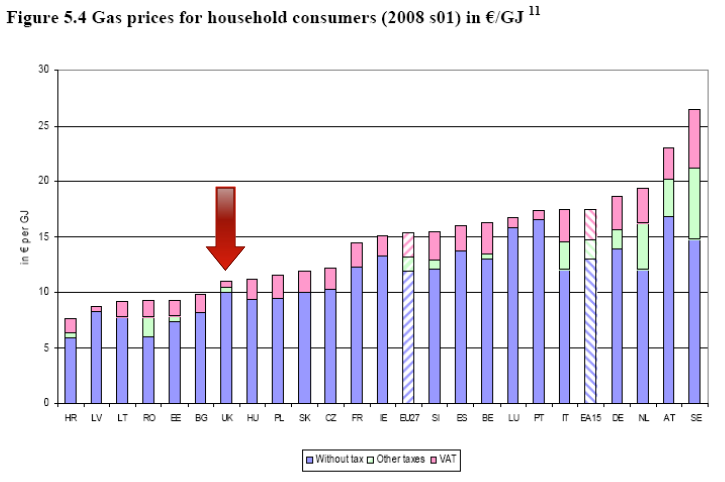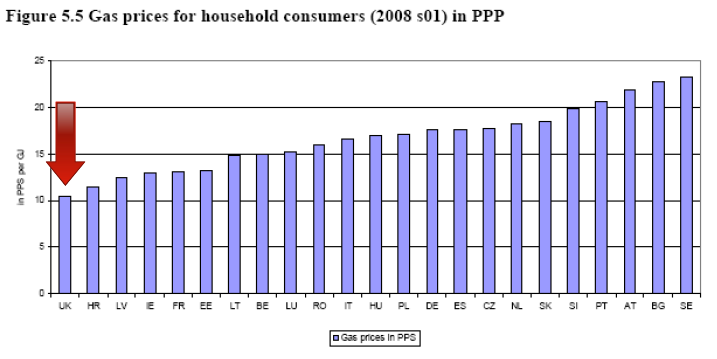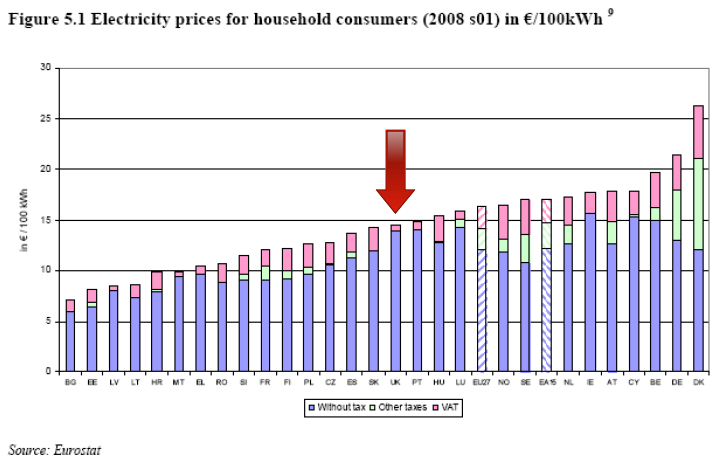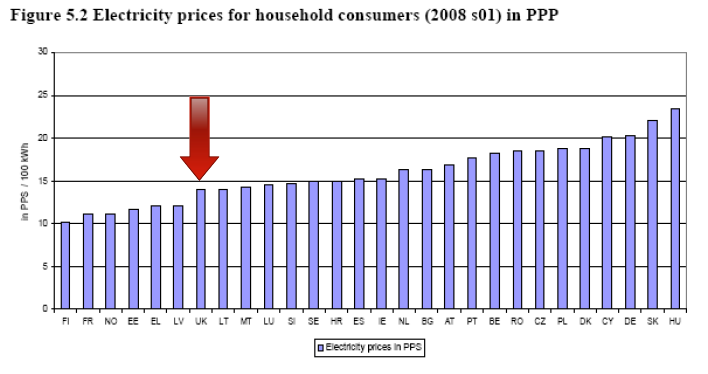Speaking of the IEA (see previous post), Richard Wellings, their excellent Deputy Editorial Director, has posted a piece on their blog, on the recent slew of climate-change policies and targets from the Government. It is mostly well-judged, but there is one point where we diverge. I need graphics to illustrate why he is mistaken, so I'm posting here rather than in the comments section on his site.
Richard rightly criticizes the impossibly ambitious targets, the delusional claims about the benefit to the economy, and the impact on what remains of our industry of increasing the costs of energy. But he overstretches when he brings domestic consumers into the picture:
"Then there is the impact on the less well off. People on benefits, for example £64 per week Jobseeker’s Allowance, may already be using around one third of their (non-housing) incomes to pay utility bills inflated by existing environmental policies."
Actually, we have the cheapest domestic energy of the EU-15 countries. Here is the comparison for gas (from European Commission, DG TREN Staff Working Document, Report on Progress in Creating the Internal Gas and Electricity Market, 11/3/1009, SEC(2009) 287):

Notice that only 6 New Accession countries had cheaper domestic gas than us (on old, unsustainable, subsidised Russian prices), so not only all the other EU-15 countries were dearer, but several of the New Accession countries as well. And notice that the reasons why domestic gas is so cheap are not only that the untaxed price is competitive, but significantly that we apply less tax to our domestic gas than any country except for Latvia. Doesn't look like domestic gas prices are too inflated by existing environmental policies, does it?
Of course, comparing prices between European countries with different costs and standards of living, wages, etc. based on exchange rates is widely recognized not to be an accurate comparison. Here is how those same prices work out if compared on the basis of Purchasing Power Parity:

If that's inflated, they need a better pump. (Incidentally, Denmark is missing from these graphs, presumably because the data weren't in on time, but if it were there, it would significantly exceed even the Swedes).
How about domestic electricity prices?

That's more middle-of-the-road, but if you look closely, most of those to the left of us are those New Accession (e.g. ex-communist) countries again. Of the EU-15 countries, only Spain, Finland, France and Greece are cheaper than us. The other 10 EU-15 countries are more expensive, as are a couple of New Accession countries. We are below the average for the EU-15 and EU-27. And why? Have a look again at the amounts of tax we apply. Only Latvia and Malta apply as little tax as us.
Here's how domestic electricity prices look, compared according to PPP rather than exchange rate:

We're pretty near the bottom of the class again.
UK domestic energy consumers are not hard-pressed, they are cosseted. They get a special low rate of VAT. The Climate-Change Levy is not applied to them. Their gas supplies do not incur the cost of the EU-ETS, and the cost of the EU-ETS on their electricity supplies is around 0.4p/kWh. Their gas supplies also do not incur any cost for the Renewables Obligation, and the cost of the RO on their electricity supplies is under 0.4p/kWh. So that's around 0.8p/kWh out of the typical 12-14p/kWh for domestic electricity, and near enough nothing on domestic gas, set against a VAT rate that is 10% lower than standard at the moment (12.5% lower normally). Yet despite this (or because of it, as we shall learn), the UK has a very high level of that arbitrary notion to which Richard seems to be referring: "fuel poverty".
Conversely, countries like Denmark and Sweden, with much higher energy costs than the UK thanks to very heavy carbon and fossil-fuel taxation, have so little "fuel poverty" that the concept is barely known to them. That is because they have very high-quality housing, which keeps the bills down even though the prices are high. And why do they have high-quality housing? Because energy is expensive, so it pays to insulate and double-glaze and be careful about how you use energy, and for businesses to invest in more-efficient technologies to supply consumers, such as CHP and district heating networks. The costs of building and upgrading the infrastructure (energy and building-stock) to a high standard are justified by the savings that can be achieved.
In the UK, even the most cost-effective improvements and the most mediocre of building standards are hard to justify by the savings that can be achieved. Builders know it and know that their customers won't notice if they go for the lowest common denominator. So we carry on with low standards and lousy houses, and fritter away our money and resources heating the atmosphere through our leaky walls and windows.
Poverty is a welfare issue, not an energy issue. Fuel poverty is not a separate phenomenon distinct from generic poverty, any more than child poverty is, or other pseudo-concepts invented by socialists who want to justify interfering in the details of people's lives. The problem for the poor is the totality of their costs (relative to their income), not certain aspects of them. The way to deal with poverty is not to try to suppress prices of some of the goods they buy. Special low rates of VAT and differential treatment of carbon (so industry pays high prices and domestic consumers pay little) are lousy ways to deal with poverty. They distort everyone's (not just the poor's) purchasing and behavioural decisions, and perpetuate exactly the things that cause the poverty. Low prices encourage inefficiency and over-consumption, which inevitably drives prices higher regardless of how low the tax is set. It's a question of who is going to get the cash from the inflated prices - the UK government or Russian oligarchs and Arabs sheikhs. If we want to reduce dependency on and waste of energy, whether individually or nationally, we need to give people incentives to conserve. [Greg Mankiw has written an excellent paper on the Smart Taxes approach to this issue, which you can download from his blog.]
The myth of fuel poverty and the delusion that the way to deal with it is to keep domestic-energy prices as low as possible are fundamental causes of the complete failure of our energy and environmental policies. It's a shame to see lip-service paid to the concept at the leading free-market think-tank.
Richard has swallowed the VILE companies' line. They tried to blame the cost of green measures when prices spiked last year, when in reality it was an insignificant factor compared to the rise in fuel costs provoked by inflated demand (in which low consumer prices were important as well as monetary, regulatory and fiscal policies) and inelasticity and insecurity of supply. This provided a useful smokescreen as they used the fuel-cost rises to hike their prices more and faster than their raw costs had gone up, and then to bring them down slower and less than the raw costs came down. And they could use susceptibility to the fuel-poverty delusion and the failure to improve efficiency in the UK (thanks to the specially favourable treatment of domestic energy) as a reason why they should be given more market power, as the organizations through whom the Government would exclusively try to push efficiency measures, in spite of the economic unviability, and ignoring the fact that these are the very organizations who have the most interest in inhibiting efficiency and selling as much energy as possible at as high a price as possible, in a spectacular example of appointing the foxes to guard the hen-house. Our political parties' energy policies, the VILE companies' evil genius in pursuit of their rent-seeking objectives, and the ignorance and gullibility of the commentariat on the issue, are a sick joke.
The right policy is to have one rate of VAT for all goods, one carbon-price applied to fossil fuels at point of production or import, and scrap the myriad of micro-managing mechanisms that are currently inflicted on us at great cost but to no great effect. That will probably increase the cost of energy to domestic consumers and airlines, keep costs about the same for industrial users (but massively reduce the complexity, bureaucratic overheads and rent-seeking opportunities), and reduce the cost to road-users.
It may be necessary to use some of the revenue from the carbon-tax to assist the poorest households whose energy bills increase as a result. But the rest of the revenue could be used to reduce taxes on economically-beneficial things, like work and productivity, so we can start to build our way out of the hole we are in, rather than continuing down the current line of increasingly penalizing the productive sector of the economy, whilst subsidizing the inefficient and wasteful parts. The encouragement of householders to burn energy to heat the atmosphere through our leaky walls and windows is perhaps the most nonsensical in that perverse current approach. It is akin to encouraging people to heat their houses by burning ten-pound notes, and then dealing with the consequential costs to consumers by making sure that the ten-pound notes only cost consumers a fiver (and cost businessmen and drivers twenty quid).

Comments
Poor consumers
Bruno - Thank you for such a comprehensive and informative post. I accept that environmental policies, as far as I can tell, have had little effect on domestic gas prices. You mention the impact of emissions trading and renewables on electricity prices, in total less than 1p per kwh. I would argue that electricity prices have also been inflated by EU regulations on sulphur emissions, which have required the largest coal-fired stations to be fitted with 'scrubbers'. There are also costs associated with planning controls for new plant - they also place constraints on the distribution network. Moreover, I don't think the subsidy of nuclear power over the last 25 years can be understood without reference to climate change politics, though once again it is difficult to put precise figures on this.
In my defence, when I wrote about the scale of utility bills for people on benefits I was including all utility bills, which include water rates. These have risen dramatically since privatisation, partly as a result of EU environmental directives.
You are, of course, absolutely correct to point to government hypocrisy regarding the VAT rate for domestic fuel. However, I would be worried that using part of the revenue from carbon taxes to help those on low incomes with their bills would reduce work incentives. There would be similar problems to those found in the benefits system regarding thresholds and tapers.
More consumers
Richard - First let me say again, I agree with the broad outline and most of what you had to say. The targets are unachievable and not calibrated in any way to the economic cost or benefit. Most of our environmental interventions are highly ineffective at delivering what they claim they are intended to achieve, and carry a high cost both directly and indirectly through inefficiency, increased bureaucracy, and skewed investment and behavioural choices. The claims about the jobs that will result from these measures are particularly absurd, as that paper by Gabriel Calzada that Peter Stroud pointed to in the comments on your site demonstrates. Of course, Gabriel is a good Austrian economist. It's a pity the UK economics establishment has made sure there are almost no Austrians left over here to do a similar demolition job on our policies.
We should be careful not to oppose any intervention simply on the basis that it imposes a cost on some people. Short of the anarcho-capitalist position, most of us accept that there is a role for government, but we believe that it should be much more limited than at present. We would probably agree that provision of the institutional framework and resources to protect person, property and nation from coercion is part of the legitimate role of government, and I would see internalization of material externalities into that institutional framework as also a legitimate role, arguably derived from the protection-of-property-rights role. On that basis, I have a hard time seeing the regulation of sulphur emissions as an unnecessary inflation of the cost of coal-fired generation.
I would apply the same argument to reasonable mechanisms to internalize the social cost of carbon. Unfortunately, we don't have any. The argument against the plethora of UK climate-change policies is not that they incur cost, but that they are inefficient, ineffective, skewed, disproportionate, perverse, irrational, etc.
As for utility bills, there would be an argument that water bills are also being maintained at an artificially low level through regulated prices, given the need to repair and replace our ageing infrastructure, and to discover the real balance between supply and demand. We're not as bad as the Australians and Californians, but we sit more on their side of the balance than on the side of inflated costs. But in any case, that seems to be of peripheral relevance to the impact on poor households of the recent swathe of government papers on climate-change policy.
How one should use the revenue from a carbon tax is always contentious. It is a significant fear of opponents of the concept that it would simply result in a higher tax-take, more government-spending, and the sort of perverse consequences you describe. I mentioned the Mankiw Smart Taxes paper. There is a nice rehearsal of this sort of argument towards the end of a podcast he made with Russ Roberts of George Mason University, as part of the excellent EconTalk series.
I agree with your opposition to any extension of means-tested welfare measures that may reduce the incentive to work. In my opinion, the critical aspect is means-testing. If I increase people's costs by £100 but balance it by improving their disposable income by £100 (whether through reduced taxes or welfare payments), then the net effect is undesirable, because of inefficiencies, but it is not a very significant disincentive to work. In fact, if one of the means by which people are compensated for the £100 increase in their costs is through a reduction in employment taxes, then the net effect may be an improvement in their incentive to work. But if, for those who are not earning enough that the reduction in employment taxes will compensate them for the increase in their energy bills, I increase means-tested benefits by £100, then I have indeed increased the disincentive to work for people whose income falls between the level at which deductions start to be made and those whose income is sufficiently high that they are not eligible for any of the benefit. That is because the means-tested withdrawal of the benefit acts effectively as a tax, thereby increasing that group's marginal effective rate of income tax, which is the critical factor on incentives to work. As I am sure you are aware and had in mind in your comment, this is already 70% or more for far too many people in the lower income quintiles, and it is vital not to either extend the number of people caught in this trap, or to further increase the marginal effective rate, but to find ways to reduce this rate in order to reduce the iniquitous poverty traps that our Byzantine tax and welfare system has created.
As you probably know, my answer to that conundrum is a Basic Income + Flat Tax system. I would use the (naturally-reducing) revenue from a carbon tax to support a lower FT rate than would otherwise be required initially to balance the books in a BI+FT system. The growth, employment and tax-revenue that should result from the dramatic reduction in marginal effective tax rates paid by lower earners should offset the reducing revenue from a carbon tax as the energy- and carbon-intensity of the economy reduced, until one reached a balance of reduced energy-consumption and increased employment.
But assuming I'm not about to become Prime Minister, we have to start from where we are, and acknowledge the political objections that would be raised to a carbon tax. That is the context for my suggestion that some of the revenue might have to be used for welfare (notice I said "might have to" not "should"). You can look at it from the perspective of people's expectations and the political difficulty of reducing welfare provision (or increasing their costs without increasing the provision, which amounts to the same thing) to those whose expectations are established by the current system (right or wrong). Or you can look at it from the point of view that such a measure would increase the minimum cost of living, that welfare (however we provide it) should ensure that unfortunates can have at least the minimum required to enjoy a dignified quality of life, and that there would therefore be a moral imperative to reflect the increased costs in increased provision. The Joseph Rowntree Foundation did some interesting work on the latter, and though I would disagree with some significant items in their list, there's no denying that energy would be on the list, they don't appear to have been over-generous in that regard, that current benefits barely cover the items one might agree are essential, and that an increase in one essential item therefore would imply an increase in welfare provision, if we are to stick with the current system.
And as you say, that would have the effect of increasing either the number of people caught by high marginal effective rates of tax, or the aggressiveness of those rates. But to me, that is an argument for changing our approach to welfare, not for avoiding a rationalization of the tax system.
(Incidentally, you'd obviously have to scrap the minimum wage as part of the BI+FT+carbon-tax system, if it were to be effective. And you'd also scrap whole swathes of complex government interventions on tax, welfare, energy and environment, with the associated economic benefits. But it would still probably result in domestic energy being more expensive in the round. And that doesn't seem like a bad thing to me.)